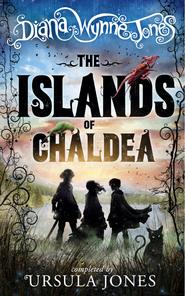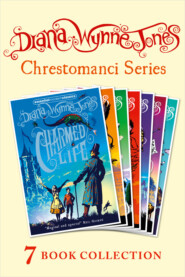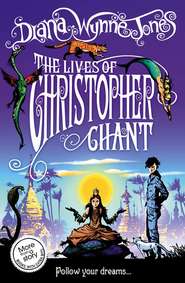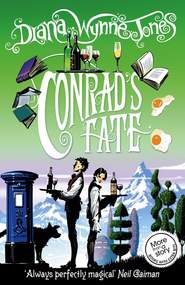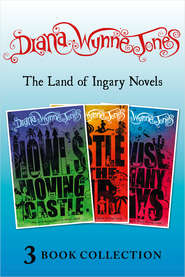По всем вопросам обращайтесь на: info@litportal.ru
(©) 2003-2024.
✖
Year of the Griffin
Автор
Год написания книги
2019
Настройки чтения
Размер шрифта
Высота строк
Поля
“Of course he does,” said Myrna. “His head’s in the moon. And I didn’t notice you offering to do anything.”
“Well,” said Finn. “My schedule—”
“As if I hadn’t enough to do!” Myrna went on. “I’ve seen to all the students’ rooms, and the college staff, and the kitchens, and the bedding – and there’s probably going to be an outcry when someone realises that I had to give Derk’s daughter the concert hall to sleep in. She’s too big for anywhere else. How is it, anyway, that Corkoran’s teaching her? Why does he always grab the most interesting students?”
“That’s just what I was going to say!” Finn cried out, seeing his chance to be truly sympathetic to Myrna. “I’ve met most of those students. I knew them as kids when I was Wizard Guide on the tours and I tell you, it’s going to serve Corkoran right for hogging the ones he thinks are best, or richest, or whatever he thinks they are.”
“They probably are the best,” Myrna said, barely listening. “I did the admissions too. The University secretaries nearly went mad over that, and they’ll go mad again now they have to get this letter out. And on top of it all, I’ve just discovered I’m pregnant!”
“Oh,” said Finn. There, he thought, went his hopes of Myrna leaving her bard. All he could think of was to say lamely, “Well, anyway, Corkoran’s in for a shock when he sees one of his new students.”
Finn was right. Next morning, Corkoran hurried into the tall stone tutorial chamber and only just managed not to stand stock still, gaping. He bit his teeth together. He knew better than anyone that his fine, fair good looks caused most students to hang adoringly on his words. He thought of his face as his best teaching aid and was well aware that letting his jaw hang spoilt the effect. So he plastered a smile across it. But he still stood rooted to the spot.
Blazing out of the decidedly motley set of young people in the room – like a sunburst, Corkoran thought dazedly – was a huge golden griffin. He was not sure he was safe. Not exactly a huge griffin, he told himself hastily. He had heard that some griffins were about twice the size of an elephant. This one was only as large as an extra big plough-horse. But she – he could somehow tell it was a she: there was an enormous, emphatic sheness to this griffin – she was so brightly golden in fur and crest and feathers, so sharply curved of beak and so fiercely alert in her round orange eyes, that at first sight she seemed to fill the room. He noticed a dwarf somewhere down by her great front talons – and noticed with irritation that the fellow was in full war-gear – but that was all. He very nearly turned and ran away.
Still, he had come to teach these students and also to find out, if possible, how wealthy their parents were, so he pasted the smile wider on his face and began his usual speech of welcome to the University.
The students gazed at him with interest, particularly at his tie, which this morning had two intertwined pink and yellow dragons on it, and at the words on his T-shirt under the tie.
“What’s MOON SOON mean?” rumbled the dwarf. Probably he thought he was whispering. It gave a peculiarly grating, surly boom to his voice.
“Hush!” said the griffin, probably whispering too. It sounded like a very small scream. “It may mean something magical.”
The dwarf leaned forward with a rattle of mail and peered. “There’s another word under his tie,” he grated. “SHOT. It’s SHOT. Why should anyone shoot the moon?”
“It must be a spell,” small-screamed the griffin.
Corkoran realised that between the two of them he was being drowned out. “Well that’s enough about the University,” he said. “Now I want to know about you. I suggest each of you speaks in turn. Tell the rest of us your name, who your parents are, and what made you want to come and study here, while the rest of you listen quietly. Why don’t you start?” he said, pointing at the large, shabby young man on the other side of the griffin. “No, no, you don’t have to stand up!” Corkoran added hastily as the young man’s morose-looking face reddened and the young man tried to scramble to his feet. “Just sit comfortably and tell us about yourself. Everyone can be quite relaxed about this.”
The young man sank back, looking far from relaxed. He seemed worried. He pulled nervously at the frayed edges of his thick woollen jacket and then planted a large hand on each knee so that they covered the patches there. “My name is Lukin,” he said. “My father is King of Luteria – in the north, you know – and I’m, er, his eldest son. My father, well, how do I put this? My father isn’t paying my fees. I don’t think he could afford to, anyway. He doesn’t approve of me doing magic and he, er, doesn’t want me here. He likes his family at home with him.”
Corkoran’s heart sank at this, and sank further as Lukin went on, “Our kingdom’s very poor, you know, because it was always being devastated by Mr Chesney’s tours. But my grandmother, my mother’s mother, that is, was a wizard – Melusine; you may have heard of her – and I’ve inherited her talent. Sort of. From the time I was ten, I was always having magical accidents, and my grandmother said the only way to stop having them was to train properly as a wizard. So she left me her money for the fees when she died, but of course the fees have gone up since her day and I’ve had to save and economise in order to be here. But I do intend to learn and I will stop having accidents. A king shouldn’t spend his time making holes in things.” He was almost crying with earnestness as he finished.
Corkoran could have cried too. He made a secret mark on his list to tell Myrna not to waste time asking King Luther for money and asked, “What kinds of accidents do you have?”
Lukin sighed. “Most kinds. But I’m worst when there’s anything to do with pits and holes.”
Corkoran had no notion how you put a stop to that kind of trouble. Perhaps Myrna did. He added another scribble to remind himself to ask Myrna. He said encouragingly, “Well, you’ve come to the right place, Lukin. Thank you. Now you.” He pointed to the large young woman sitting behind the dwarf. She was very elegantly dressed in dark suede, and the elegance extended to her long, fine, fair hair, which was drawn stylishly back inside an expensive-looking scarf to set off her decidedly beautiful hawk-like face. From the look of command on that face and the hugely expensive fur cloak thrown casually over the chair behind her, Corkoran had no doubt that she was the Emperor’s sister.
She gave him a piercing blue-eyed look. “I am Olga,” she said.
“And?” invited Corkoran.
“I do not wish to say,” she replied. “Here, I wish to be accepted as I am, purely for magical ability. I have been raising winds and monsters since I was quite a small child.” She sat back, clearly intending to say no more.
So the Emperor’s sister wishes to remain incognita, Corkoran thought. Fair enough. It could be awkward with the other students. He nodded knowingly and pointed to the tall, narrow, brown-faced fellow half hidden behind Olga and the griffin’s left wing. “And you?”
“Felim ben Felim,” the young man replied, bowing in the manner of the eastern countries. “I too wish to say little about myself. If the Emir were to discover I am here studying, he would very likely dispatch assassins to terminate me. He has promised that he would, at least.”
“Oh,” said Corkoran. “Er, is the Emir likely to discover you?”
“I trust not,” Felim replied calmly. “My tutor, the Wizard Fatima, has cast many spells to prevent the Emir noticing my absence, and she furthermore assures me that the wards of the University will be considerable protection to me also. But our lives are in the laps of the gods.”
“True,” Corkoran said, making a particularly black and emphatic scribble beside Felim’s name. He did not know Wizard Fatima and certainly did not share the woman’s faith that the University could protect anyone from assassins. Myrna must definitely not send a letter to Felim’s parents. If the answer came in assassins, they could all be in trouble. A pity. People were rich in the Emirates. He sighed and pointed with his pen at the other young woman in the group, sitting quietly behind Lukin. Corkoran had her placed in his mind, almost from the start, as the daughter of Wizard Derk. He had met Derk more than once and had been struck by his unassuming look. Quite extraordinary, Corkoran always thought, that the man whom the gods had trusted with the job of setting the world to rights after what Mr Chesney had done to it should look so modest. The young woman had a similar humble, almost harassed look. She was rather brown and very skinny, and sat huddled in a shawl of some kind, over which her hair fell in dark, wet-looking coils on her shoulders. She twisted her long fingers in the shawl as she spoke. Corkoran could have sworn her dark ringlets of hair twisted about too. She gave him a worried stare from huge greenish eyes.
“I’m Claudia,” she said huskily, “and the Emperor of the South is my half-brother. Titus is in a very difficult position over me, because my mother is a Marshwoman and the Senate doesn’t want to acknowledge me as a citizen of the Empire. My mother was so unhappy there in the Empire, you see, that she went back to the Marshes. The Senate thinks I should renounce my citizenship like Mother did, but Titus doesn’t want me to do that at all. And the trouble over me got worse when it turned out that the gift for magic that all Marshpeople have didn’t mix at all with Empire magic. I’m afraid I have a jinx. In the end, Titus sent me here secretly for safety, hoping I could learn enough to cure the jinx.”
Corkoran tried not to look as amazed as he felt. His eyes shot to Olga. Was she Derk’s daughter then? He switched his eyes back to Claudia with an effort. He could see she had Marsh blood now. That olive skin and the thinness, which always made him think of frogs. His sympathy was with the Senate there. Perhaps they would pay the University to keep the girl. “What kind of jinx?” he said.
A slightly greenish blush swept over Claudia’s thin face. “It goes through everything,” she sighed. “It made it rather difficult to get here.”
This was exasperating, Corkoran thought. Something that serious was almost certainly incurable. It was frustrating. So far, he had a king’s son with no money, an obviously wealthy girl who would not say who she was, a young man threatened with assassins if the University admitted he was here, and now the Emperor’s jinxed sister that the Empire didn’t want. He turned with some relief to the dwarf. Dwarfs always had treasure – and tribes, too, who were prepared to back them up. “You now,” he said.
The dwarf stared at him. Or rather, he stared at Corkoran’s tie, frowning a little. Corkoran never minded this. He preferred it to meeting students’ eyes. His ties were designed to deflect the melting glances of girl students and to enable him to watch all students without them watching him. But the dwarf went on staring and frowning until Corkoran was almost uncomfortable. In the manner of dwarfs, he had his reddish hair and beard in numbers of skinny pigtails, each one with clacking bones and tufts of red cloth plaited into it. The braids of his beard were noticeably thin and short, and the face that frowned from under the steel war-helm was pink and rounded and young.
“Ruskin,” the dwarf said at last in his peculiar blaring voice. The voice must be caused by resonance in the dwarf’s huge square chest, Corkoran decided. “Dwarf, artisan tribe, from Central Peaks fastness, come by the virtual manumission of apostolic strength to train on behalf of the lower orders.”
“How do you mean?” Corkoran asked.
The dwarf’s bushy red eyebrows went up. “How do I mean? Obvious, isn’t it?”
“Not to me,” Corkoran said frankly. “I understood ‘dwarf’ and ‘Central Peaks’ and that was all. Start again, and say it in words that people who are not dwarfs can understand.”
The dwarf sighed, boomingly. “I thought wizards were supposed to divine things,” he grumbled. “All right. I’m from one of the lowest tribes in our fastness, see. Artisans. Got that? Third lowest. Drudges and whetters are lower. Six tribes above us, miners, artists, designers, jewellers and so on. Forgemasters at the top. All ordering us about and lording it over us and making out we can’t acquire the skills that give us the privileges they have. And around this time last year we got proof that this was nonsense. That was when Storn and Becula, both artisans and one a girl, forged a magic ring better than anything the forgemasters ever did. But the ring was turned down for treasure because they were only artisans. See? So we got angry, us artisans, and brought in drudges and whetters – and it turned out they’d made good things too but hadn’t even submitted them as treasure because they knew they’d be turned down. Oppression, that’s what it was, black oppression—”
“All right. Don’t get carried away,” Corkoran said. “Just explain how you come into it.”
“Chosen, wasn’t I?” Ruskin said. A slight, proud smile flitted above his plaited beard. “It had to be someone young enough not to be noticed missing, and good enough to benefit here. They picked me. Then each one of them, young and old, man and woman, from all three tribes, put down a piece of gold for the fees and a piece of their magic into me. That’s the apostolic part. Then I came away secretly. That’s what we call virtual manumission. And I’m to learn to be a proper wizard, so that when I am I go back and smash those forgemasters and all the rest of them. Overthrow the injustice of the old corrupt order, see?”
And now a dwarf revolutionary! Corkoran thought. Bother! He saw that if Myrna sent out her letter to Central Peaks fastness, it would almost certainly bring an enraged party of forgemasters (and so forth) here to remove Ruskin and his fees with him. He made another note by Ruskin’s name, while he asked, “Is that why you’re in full armour?”
“No,” Ruskin answered. “I have to come before my tutor properly dressed, don’t I?” He eyed Corkoran’s tie and T-shirt again, and frowned.
“I advise you to leave it off in future,” Corkoran told him. “Iron interferes with magic and you won’t know enough to counteract it until your second year. You’re going to have trouble anyway, if you’re working with bits and pieces of other people’s magic.”
“Don’t think so,” Ruskin blared. “We dwarfs are used to that. Do it all the time. And we work with iron.”
Corkoran gave him up and turned, finally, to the griffin. “You.”
All this while, the griffin had sat, brightly swivelling an eye on each student who spoke, and quivering with eagerness for her turn. Now she fairly burst forth, both wings rising and tufted tail lashing so that Felim and Olga had to move out of their way. “I’m Elda,” she said happily. “Wizard Derk’s daughter. I used to be his youngest child, but now I’ve got two younger than me – Angelo and Florence. Flo’s wings are pink. She’s the baby. She’s beautiful. Angelo’s wings are brown, a bit like Callette’s without the stripes, and he’s a magic-user already. Mum says—”
“Hang on,” said Corkoran. “Wizard Derk is human. You’re a griffin. How come—?”
“Everyone asks about that,” Elda said sunnily. “Dad made us, you know. He put some of himself and Mum and eagle and lion – and cat for me – into an egg and we hatched. At least, we had an egg each. There’s me and Lydda and Don and Callette and Kit who are all griffins. Shona and Blade are my human brother and sister, like Angelo and Flo, except that Shona and Blade don’t have wings. Shona’s married. She’s gone to run that new Bardic College out on the east coast. She’s got three girls and two boys and I’m an aunt. And all the others except Mum and Dad and the babies have gone over to the West Continent in two ships, because there’s a war there – only Lydda’s flying, because she’s a long-distance flier and she can do a hundred and fifty miles without coming down to rest, but Dad made her promise to keep in sight of the ships just in case, because Kit and Blade are the ones who can do magic. Callette—”
“But what about yourself?” Corkoran asked, managing to break in on this spate of family history.
“What about me?” Elda said, tipping her bright bird head to look at him out of one large orange eye. “You mean, why did Mum send me here to keep me out of mischief?”






